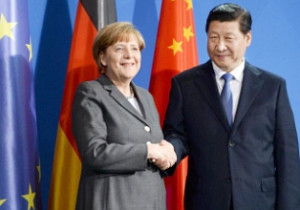
As was the case in 2012, Merkel’s latest visit was accompanied by an unprecedented diplomatic protocol. In terms of its “splendor”, it could only rival the protocol surrounding the Chinese visit of Russia’s President Vladimir Putin which occurred two months prior.
It is important to note that China and Germany – the two countries that both play the part of the “engine” within the economic and political processes in their respective regions – have once again “synchronised watches” only three months after Merkel welcomed Xi Jinping during his European tour.
All of this underlines the long observed “special nature” of the relations between these two countries, especially at a time when there is a certain chill in the relations between Germany and its key military and political ally, the US.
The same as two years ago, the bilateral negotiations centred on the issue of economic cooperation, various aspects of which were discussed during another session of a joint commission. The special importance of this economic cooperation could also be seen in the members of the expansive delegation accompanying Angela Merkel, which primarily represented the German business circles.
China is Germany’s third largest trading partner globally, after the EU and the US, and its primary partner in the Asia Pacific Region. In turn, Germany occupies the undoubted top spot in China’s trade on the European continent. About one third of all trade between China and the EU is conducted with Germany. In 2013, the volume of trade between Germany and China reached $193 billion ($169 billion in 2011). This is more than double the volume of trade between China and Russia, but is significantly lower than China’s trade with the US and Japan (three times lower and one-and-a-half times, respectively).
As was the case two years ago, the parties concluded a number of important trading and economic cooperation agreements. In particular, Volkswagen will build two car manufacturing plants in China. China will also purchase 100 helicopters from the Franco-German company Airbus. Cooperation between the two leading national airlines Lufthansa and Air China will be expanded. Earlier during Xi Jingping’s visit to Germany, an agreement was concluded to expand cooperation between the German car giants Daimler AG and BMW and Chinese car manufacturers.
The same as two years ago, one of the key issues that Merkel was resolving during the present visit consisted in encouraging Beijing to strengthen the positions currently occupied by the European currency, the Eurozone and, correspondingly, Germany’s leading position in Europe.
During negotiations with her colleague Li Keqiang, Merkel could not simply ignore a notable German sore spot – the topic of industrial espionage. Without specifying who she was addressing, Merkel voiced her opinion against this practice, “which is a mistaken path towards economic success”.
However, German counterintelligence did not see the need to keep up appearances. In an interview with the paper Welt am Sonntag, one of their spokespeople stated that “the Chinese technical intelligence employs around 100,000 specialists” and for an organisation this powerful, “German mid-sized businesses make an easy target”.
This seemed to be virtually the only moment that could somehow cast a shadow over the otherwise smooth visit. As was the case two years ago, Merkel was exceedingly cautious with any statements about “human rights violations” in China, even despite the rising tensions in Xinjiang and the corresponding pressure exerted from international human rights movements.
That being said, the visit’s overly public entourage (excessive for business talks) points to the fact that the bilateral meeting’s daily agenda greatly exceeded strictly financial and economic matters. Both country’s leaders also had their eyes on important aspects of the currently unfolding global political environment.
For China, establishing better relations with the EU countries and its leader Germany takes on a new importance amidst its global rivalry with the US as well as their important ally, Japan. At the same time, the “special relationship” between Germany and China give rise to mixed feelings in Europe.
On the one hand, Germany is sort of pushes the interests of all EU countries in China. However, this also begs the question of whether this German leadership in the leading Asian country gives rise to the “Germanization” of the EU itself?
The two countries are equally happy with both the results of Angela Merkel’s latest visit to China as well as the overall shape of their bilateral relations. An official spokesman of the Chinese government stated that the German-Chinese relations are “are at their best in history” and “are strongly underpinned by the pragmatic cooperation between the two economic heavyweights”.
It is undeniable that the strengthening of relations between two nations that occupy leading positions in opposite regions of the world is a significant event in the continuing process of drawing the global political map.
Vladimir Terekhov, leading research fellow at the Center for Asian and Middle Eastern Studies at the Russian Institute of Strategic Research, exclusively for the online magazine “New Eastern Outlook”.
